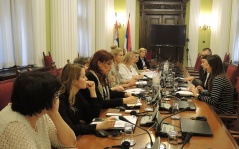National Assembly of the Republic of Serbia / Activities / Activity details

3 February 2016 WPN, Social Inclusion and Poverty Reduction Unit and the Director of the European Institute for Gender Equality
Wednesday, 3 February 2016
Women’s Parliamentary Network Meets with Social Inclusion and Poverty Reduction Unit and European Institute for Gender Equality Director
The representatives of the Women’s Parliamentary Network met today, at the National Assembly House, with representatives of the Social Inclusion and Poverty Reduction Unit and the Director of the European Institute for Gender Equality Virginia Langbakk.
The Gender Equality Index, measured in Serbia for the first time, shows that Serbia is not even half-way to achieving gender equality and lags behind the European Union by 12%. The Director of the European Institute for Gender Equality Virginia Langbakk said that the domains of work, money, knowledge and time require immediate action because their low results point to a big gap between the sexes. The domain of power has somewhat better results due to the National Assembly’s gender quota and the fact that the Governor of the National Bank of Serbia is a woman. The domain of health has the best results.
Women’s Parliamentary Network coordinator Ljiljana Nestorovic said that gender equality should be built up and developed primarily in vital spheres such as employment, economic empowerment and reduction of violence against women. That is why she suggested organising another meeting to set up the mechanisms needed to change the existing situation.
As a priority, Gordana Comic stressed a change to the Law on Government that would insist on parity i.e. 50% participation of women in the Government. “If we have a reasonable society, then we have innovation. I believe that women should be the innovation in politics not only in Serbia, but in all of Europe” stressed Comic.
Dubravka Filipovski mentioned the European Parliament’s recommendation that by 2020 women should comprise 40% of all big companies, adding that a constant monitoring of the application of said recommendation is very important. She agreed that parity in the executive power is a must, highlighting the fact that Serbia has very few women executives or mayors. Filipovski believes that an improvement in the status of women requires changes within the political parties and concentrated efforts on women’s economic empowerment. The meeting was attended by Ljiljana Nestorovic, Sabina Dazdarevic, Gordana Comic, Nevena Stojanovic, Dubravka Filipovski, Elvira Kovacs, Vera Paunovic and Olena Papuga.



